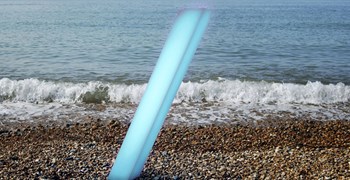Immersive 3D digital grave reconstruction marks one year since Richard III re-interment
This article originally appeared on Culture24.
A new piece of 3D kit allows us to see the skeleton and grave of Richard III in dramatic detail
 The interactive digital model of Richard III in his grave can be explored via the 3D sharing platform Sketchfab© University of Leicester
The interactive digital model of Richard III in his grave can be explored via the 3D sharing platform Sketchfab© University of LeicesterA fully rotatable computer model, created by the team from University of Leicester Archaeological Services (ULAS), shows the king’s remains in-situ as they were found during the 2012 archaeological excavation.
In association with the Richard III Society and their determined member Philippa Langley, ULAS archaeologists excavated the lost Last Plantagenet King in September 2015 from the site of the former Greyfriars Church.
DNA identification later confirmed the identity of the skeleton which had “significant trauma” to the skull consistent with battle injuries, together with “spinal abnormalities” indicating severe scoliosis.
The remains of the king were reburied at Leicester Cathedral on March 26 2015 in a global event witnessed by millions of people around the world.
 The remains of King Richard III were found by a team of archaeologists from the University of Leicester beneath a city centre car park in Leicester in 2012.© University of Leicester
The remains of King Richard III were found by a team of archaeologists from the University of Leicester beneath a city centre car park in Leicester in 2012.© University of LeicesterUsing photographs taken during the project, sophisticated photogrammetry software, which turns multiple two-dimensional digital photographs into a three-dimensional model, now takes people back to the dramatic discovery with an accurate representation of the grave and the skeleton.
The interactive immersive model, which can be explored via the 3D sharing platform Sketchfab, graphically reveals the minimal reverence with which the king was buried. After his death and defeat at The Battle of Bosworth in August 1485 he was interred in Greyfriars Church, without a coffin, in a hastily dug grave that was too short for him.
Mathew Morris, Site Supervisor for ULAS and the man who first discovered the King’s remains, explained how photographs and drawings of the grave, whilst dramatic, “are only two-dimensional and do not always best show nuances in spatial relationships that a three-dimensional model can”.
“Photogrammetry provides a fantastic analytical tool that allows us to examine the grave from angles that would have been physically difficult or impossible to achieve during the excavation and gives us the ability to continue to examine the king’s grave long after the excavation has finished.
“During the excavation in 2012 we took photographs of the skeleton from multiple angles to create a lasting record of how the king’s bones were positioned in the grave before we exhumed them. These photos were not taken with photogrammetry in mind but the software is incredibly versatile and can be applied retrospectively to create this superb model.”
King Richard III’s grave and other digital models of recent archaeological discoveries made by ULAS are all viewable via the 3D sharing platform Sketchfab.
 Mathew Morris, Site Supervisor for University of Leicester Archaeological Services. © University of Leicester
Mathew Morris, Site Supervisor for University of Leicester Archaeological Services. © University of LeicesterWhat do you think? Leave a comment below.
More on Richard III:
From car park to royal tomb: Ten stories from the discovery of Richard III












